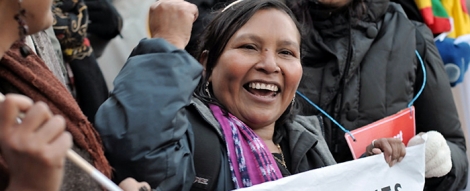Open Internet: UN Human Rights Day’s Spotlight on Inclusion and Participation


[Geneva, Switzerland] – The Internet Society joined world-wide celebrations of the United Nations Human Rights Day and welcomed its focus on inclusion and the right of all people to participate in public life and make their voices heard.
The Internet, in just a few years, has emerged as a major platform for communication and expression, amplifying the voices of more than two billion people around the world. The open and global network offers the potential for greater inclusion in public issues and provides a platform for individuals to influence the decisions that shape their communities.
“The open and unencumbered Internet has become a key means by which people can share, receive, and impart information across frontiers,” stated Markus Kummer, Vice President of Public Policy, Internet Society. “The Internet can play a major role in empowering people to have their voices heard. The inclusion of citizens in public life is central to the functioning of a vibrant democratic society.”
Responses by more than 10,000 people around the world to the Internet Society’s Global Internet Survey confirmed that people view the Internet as an essential channel for sharing and expressing their views:
- 89 percent agreed or agreed strongly that Internet access allows freedom of expression on all subjects, and 86 percent agreed or agreed strongly that freedom of expression should be guaranteed on the Internet.
- 60 percent of respondents agreed or agreed strongly that Internet access has contributed significantly to civil action and political awareness in their country.
The development and continued evolution of the Internet is also defined by and dependent on open and participatory processes. Users are empowered to innovate without permission because of the bottom-up approach used in Internet technical standards development, such as those undertaken by the Internet Engineering Task Force (IETF).
Kummer commented, “The open and inclusive model of Internet standards development means that anyone can build upon the work of those that went before them. The Internet model empowers users and provides them with the right to participate in the development of the Internet; a right we are celebrating today.”
Inclusion is particularly meaningful for persons with disabilities, such as hearing or visual impairments. The W3C has developed standards – the W3C’s Web Content Accessibility Guidelines – that enable persons with disabilities to access websites and help them to find information on the Web more quickly.
Kummer noted, “The Internet gives persons with disabilities the means to participate actively within their community on a more equitable and inclusive basis, in a manner that was previously not possible.”
Shortly after Human Rights Day, the Internet Society will publish the preliminary version of a discussion paper that looks specifically at the fundamental processes that make the Internet a success, and how those standards and protocol development processes map with the processes by which human rights standards are developed.
For more information on the United Nations Human Rights Day 2012 (OHCHR):http://www.un.org/en/events/humanrightsday/
For more information on the Internet Society’s engagement on Human Rights Day, visit:
http://www.internetsociety.org/humanrights/human-rights-day-your-voice-c…
Press release source.
 Follow
Follow